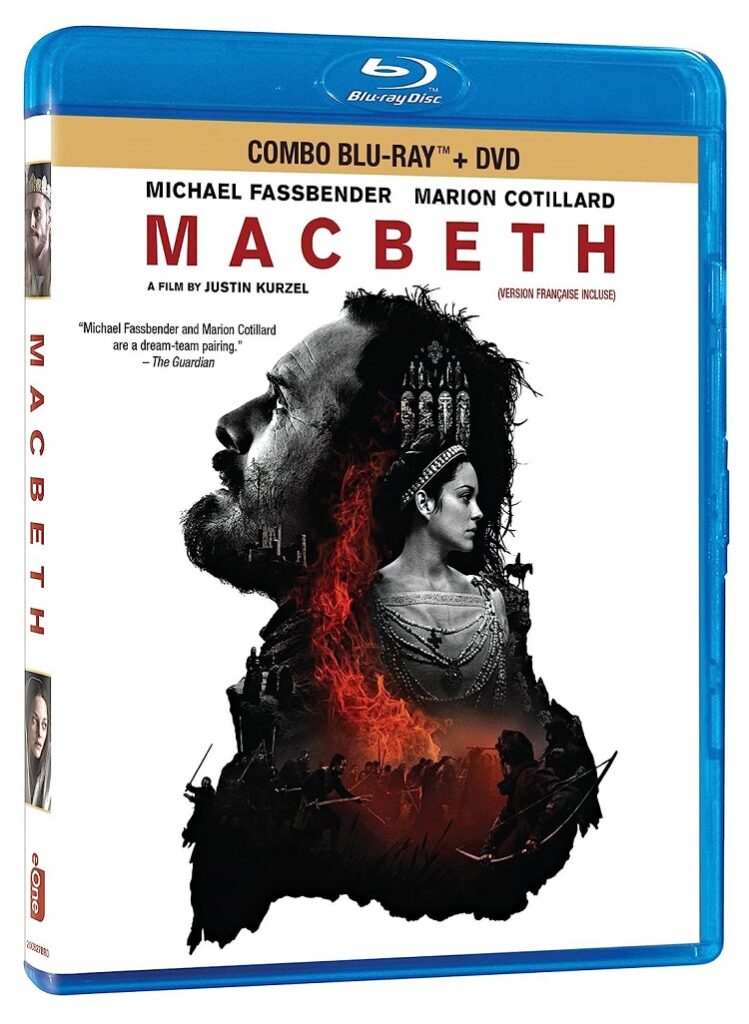
Directors of both stage and screen love fiddling with the settings, periods, and sometimes even the words of William Shakespeare. His plays have been transplanted from Shakespeare’s own 16th Century to modern times and every period in between. The play’s settings regularly gets moved around to suit the director’s whims and his words have been translated and modified time and time again. This speaks to how well his dramas speak to every person in every age. It also says something about how director’s attempt to mold great works under their own visions.
In one of the features on the Blu-ray of his Macbeth, director Justin Kurzel speaks about how he wanted to change the motivations of Macbeth (Michael Fassbender) away from the standard greed and power lust to something more modern – namely post traumatic stress disorder. Early in the story (told most graphically, and beautiful), Macbeth and his men war with the traitorous Macdonald. Afterwards, he sees visions of witches who profess that he will be king, which leads him on a murderous rampage to capture the crown and keep it.
It’s an interesting idea that Macbeth is really suffering from PTSD. Certainly in Shakespeare’s time, there was no such phrase nor understanding of the disorder but someone as wise as Shakespeare could certainly get a feel for how war changes even the strongest men. I’m not sure it holds up all that well under scrutiny, but good for them shining new light on an old story.
Kurzel plays with the drama even more by hacking great sheathes of the dialogue (and more than a few monologues) and offers instead long, beautiful, and affecting shots of God’s good earth and the men who wreak havoc upon it. The violence often plays out in slow motion, giving us a sense of it in the most visceral of ways.
It is the visuals of the film that are most involving, much more so than words or actors. Kunzel and cinematographer Adam Arkapaw infuse every shot of the film with a gorgeous aura of eeriness. It’s not that the acting is bad, for it’s really quite good. Fassbender gives great weight to Macbeth’s deeds and his face shows ever nuance of grief and greed and confusion the character wanders through. French actress Marion Cotillard plays Lady Macbeth and maintains her accent but manages Shakespeare’s sometimes twisty words quite well. Interestingly, both tend to whisper their greatest speeches as if the words were too much for them to bear. Unfortunately, that also means they are difficult for the audience to hear.
The story you likely know, but this is a review so we must summarize. After defeating the traitors, Macbeth sees four witches (one more than the usual three of the play, an added child which becomes something of a theme) who tell him he shall soon become king of Scotland. Egged on by his wife, Macbeth murders the true king and takes his place. Glory does not last long for guilt and paranoia soon take charge as Macbeth begins to murder all whom he imagines might usurp his throne (including a woman and her small children). This proves to eventually be his undoing.
In this version, children, and the memory of children, play a deep part. In the opening moments, Kurzel has added a new scene in which we see Macbeth and his wife lay to rest their small child. Later in the great battle, we see that many young men, boys really, fought and lost their lives. One of these continually pops up in visions, torturing Macbeth. As mentioned, Macbeth kills a woman and her children to get as someone he believes is after him. And again there is a fourth witch, but a girl really, who prophesizes along side her sisters. These scenes drill home Kurzel’s notions of traumatic stress and Macbeth’s mental breakdown.
It is a stunningly gorgeous film that is given excellent treatment in this Blu-ray edition. It is dense and moody and bleak, but beautiful all the same. I’m not by any means a Shakespearean purist but having cut so much of the words out it does feel light somehow. Dense in visual, light in poetry if you understand my meaning.
The Blu-ray looks superb. The color palette and visual aesthetic are rather bleak, but it looks utterly gorgeous. Details are intimate and refined and I noticed no defects whatsoever. Likewise, the audio detail is stunning. The soundscape is submersive with all speakers exploding with details of battles, music, and nature. There are only two supplements: a brief featurette and a longer question-and-answer session with Fassbender.
Roman Polanski made his version of Macbeth in 1971. It is a bleak, pessimistic, and completely enthralling portrayal of the story. Kurzel’s version gives us so much more to look at in awe, but loses a great deal of Shakespeare’s language. Somewhere between these two is the defining version of the story. Or perhaps we already have that with Akira Kurosawa’s Throne of Blood.